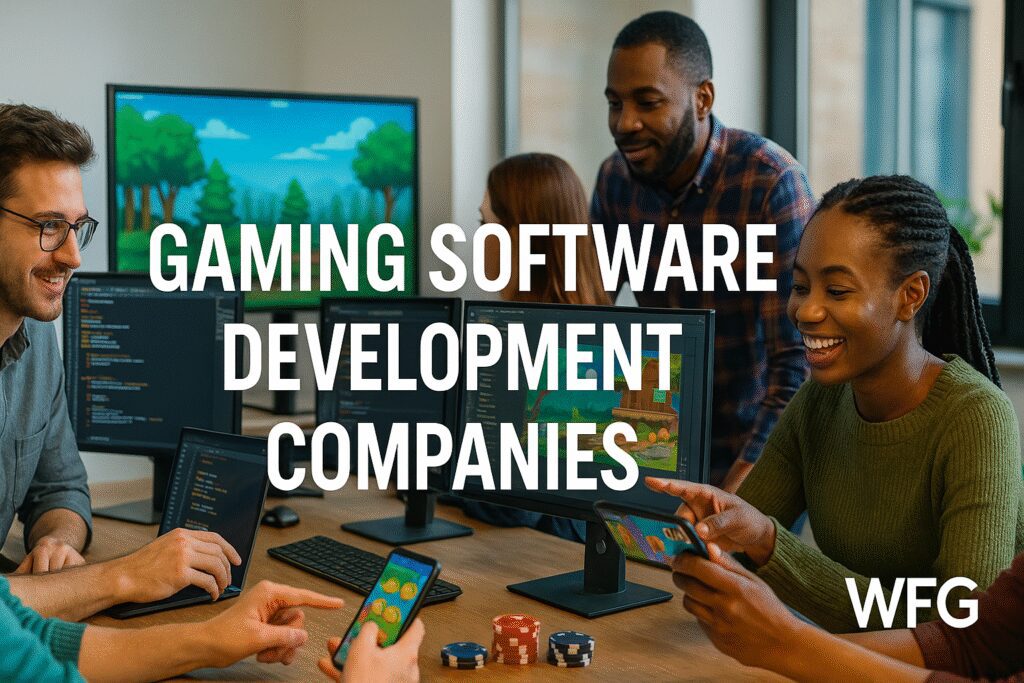Gaming software development companies have become essential partners for publishers and studios facing increasingly complex technical demands in today’s competitive market. Whether you’re struggling with platform-specific challenges, performance bottlenecks, or skill gaps within your development team, the right external partner can transform obstacles into opportunities for innovation and growth.
The gaming industry’s rapid evolution has created a landscape where even established studios find themselves needing specialized expertise that goes beyond their core competencies. From implementing cutting-edge AI systems to optimizing cross-platform performance, gaming software development companies offer targeted solutions that can accelerate your project timelines while maintaining the quality standards your audience expects.
Common Development Challenges Facing Game Publishers and Studios
Platform-Specific Technical Hurdles

Gaming software development companies frequently address the complex technical requirements that vary dramatically across different gaming platforms. Console development demands intimate knowledge of hardware specifications, memory management, and platform-specific optimization techniques that can take internal teams months to master. Mobile platforms introduce additional challenges with fragmented device ecosystems, varying screen resolutions, and performance constraints that require specialized optimization strategies.
Games You Make Real Money On: A Stay-at-Home Parent’s How-to Guide
Many studios discover that what works seamlessly on PC becomes problematic when porting to console platforms. The intricacies of PlayStation 5’s SSD architecture, Xbox Series X’s Quick Resume feature, or Nintendo Switch’s hybrid docked-undocked performance modes require deep technical expertise that gaming software development companies have refined through multiple project cycles.
Scalability and Performance Bottlenecks
Performance optimization represents one of the most critical areas where gaming software development companies provide invaluable expertise. Studios often encounter scalability issues when their games exceed anticipated player loads or when multiplayer systems strain under real-world conditions. These challenges become particularly acute during launch periods when player numbers spike unexpectedly.
Network architecture bottlenecks can cripple multiplayer experiences, while inefficient rendering pipelines can cause frame rate drops that destroy immersion. Gaming software development companies bring proven methodologies for load testing, server optimization, and rendering efficiency that prevent these issues from reaching production environments.
Cross-Platform Compatibility Issues
Modern gaming audiences expect seamless experiences across multiple devices and platforms, yet achieving true cross-platform compatibility remains technically challenging. Gaming software development companies specialize in creating unified codebases that maintain consistent performance and feature parity across PC, console, and mobile platforms without compromising the unique advantages of each platform.
Save game synchronization, cross-platform multiplayer matchmaking, and unified user interface design require specialized knowledge of each platform’s APIs, networking protocols, and user experience guidelines. These technical challenges multiply when considering emerging platforms like cloud gaming services or VR headsets.
Specialized Skill Gaps in Development Teams
Even well-established studios face skill gaps in rapidly evolving areas like machine learning implementation, blockchain integration, or advanced physics simulation. Gaming software development companies maintain specialized teams that stay current with emerging technologies, allowing studios to incorporate cutting-edge features without the overhead of hiring and training full-time specialists.
Graphics programming expertise, particularly in areas like ray tracing implementation or advanced lighting systems, represents another common skill gap. The technical knowledge required to optimize these systems across different hardware configurations often exceeds what generalist developers can reasonably master alongside their primary responsibilities.
How Gaming Software Development Companies Address Studio Pain Points
Specialized Expertise for Complex Game Mechanics
Gaming software development companies bring deep technical knowledge to implement complex game mechanics that would otherwise require extensive research and development time. Advanced AI behavior systems, procedural generation algorithms, and sophisticated physics simulations benefit from specialized expertise that has been refined across multiple projects and game genres.
These companies maintain dedicated teams focused on specific technical challenges, allowing them to develop optimized solutions more efficiently than studios attempting to build expertise from scratch. Their experience across diverse projects provides valuable insights into potential pitfalls and optimization opportunities that internal teams might overlook.
Rapid Prototyping and MVP Development Solutions
Time-to-market pressures often force studios to choose between thorough development and meeting launch deadlines. Gaming software development companies excel at rapid prototyping that allows studios to test core gameplay concepts quickly while maintaining the technical foundation necessary for full-scale development.
Their established development pipelines, asset libraries, and proven architectural patterns enable faster iteration cycles that help studios validate game concepts before committing significant resources. This approach reduces development risk while providing concrete gameplay demonstrations for publishers, investors, or stakeholders.
Legacy Game Modernization and Porting Services
Many studios possess valuable intellectual property in older games that could benefit from modernization but lack the specialized knowledge required for effective ports or remasters. Gaming software development companies offer comprehensive modernization services that update legacy codebases to current technical standards while preserving the original gameplay experience that made these titles successful.
These services extend beyond simple graphical updates to include modern input methods, cloud save integration, achievement systems, and compatibility with current gaming platforms. The technical expertise required to reverse-engineer older code architectures and implement modern equivalents represents a specialized skill set that gaming software development companies have developed through extensive experience with legacy systems.
Key Technical Solutions Gaming Development Companies Provide
Custom Game Engine Development and Optimization
Gaming software development companies often specialize in custom game engine development tailored to specific project requirements that commercial engines cannot adequately address. These custom solutions provide optimized performance for unique gameplay mechanics, specialized rendering requirements, or platform-specific features that generic engines handle inefficiently.
Engine optimization services focus on maximizing performance within existing frameworks, whether that involves optimizing Unity builds for mobile platforms or enhancing Unreal Engine performance for specific hardware configurations. These optimizations can significantly improve frame rates, reduce loading times, and enhance overall player experience without requiring fundamental architectural changes.
Multiplayer Infrastructure and Backend Systems
Multiplayer gaming infrastructure represents one of the most complex technical challenges facing modern game development. Gaming software development companies provide comprehensive backend solutions including matchmaking systems, dedicated server management, anti-cheat implementation, and player data synchronization across multiple platforms.
Cloud-based scaling solutions ensure that multiplayer systems can handle varying player loads without service degradation. These systems incorporate sophisticated load balancing, database optimization, and caching strategies that maintain consistent performance during peak usage periods while minimizing operational costs during off-peak times.
AI and Procedural Content Generation
Artificial intelligence implementation in gaming extends far beyond basic enemy behavior patterns to include dynamic difficulty adjustment, procedural content generation, and adaptive storytelling systems. Gaming software development companies develop AI solutions that enhance gameplay without overwhelming development budgets or technical complexity.
Procedural generation systems create virtually unlimited content variations while maintaining design coherence and quality standards. These systems reduce content creation overhead while providing players with experiences that remain engaging across extended play sessions.
VR/AR and Emerging Technology Integration
Virtual and augmented reality platforms introduce unique technical challenges including motion tracking optimization, haptic feedback integration, and specialized user interface design. Gaming software development companies maintain expertise in these emerging technologies, allowing traditional studios to explore new platforms without significant internal investment in specialized knowledge.
Integration with emerging technologies like blockchain, NFTs, or metaverse platforms requires understanding of both gaming development principles and the technical requirements of these new ecosystems. Gaming software development companies provide bridge expertise that allows studios to experiment with emerging technologies while maintaining focus on core gameplay development.
Selecting the Right Gaming Software Development Partner
Evaluating Technical Expertise and Portfolio Depth
Successful partnerships with gaming software development companies require careful evaluation of their technical capabilities relative to your specific project requirements. Portfolio analysis should focus on projects that demonstrate relevant technical expertise rather than simply impressive visual presentations or commercial success metrics.
Technical expertise evaluation should include code quality assessment, performance optimization examples, and problem-solving approaches that align with your development challenges. The most impressive portfolios mean little if the technical approaches don’t match your project’s specific requirements or technical constraints.
Understanding Development Methodologies and Communication
Effective collaboration with gaming software development companies depends heavily on compatible development methodologies and communication practices. Agile development approaches work well for iterative game development, but the specific implementation of sprint planning, milestone tracking, and quality assurance processes can vary significantly between companies.
Communication frequency, reporting standards, and collaborative tools significantly impact project success. Clear expectations regarding progress updates, technical documentation, and stakeholder involvement prevent misunderstandings that can derail development timelines or compromise project quality.
Cost Models and Project Timeline Considerations
Gaming software development companies typically offer various pricing models including fixed-price contracts, hourly billing, and revenue-sharing arrangements. Each model presents different risk profiles and incentive structures that align differently with various project types and development phases.
Best Site to Win Money: Legit Platforms That Actually Pay
Timeline estimation accuracy varies significantly between companies and depends heavily on project complexity, technical requirements, and scope definition clarity. Realistic timeline expectations require understanding both the technical challenges involved and the development company’s historical performance on similar projects.
Top Gaming Software Development Companies by Specialization
Mobile Gaming Specialists
Mobile gaming development requires specialized knowledge of platform-specific optimization, monetization integration, and user acquisition strategies. Leading mobile-focused gaming software development companies maintain expertise in iOS and Android development frameworks while understanding the unique performance constraints and user behavior patterns that define mobile gaming success.
These specialists understand app store optimization, social media integration, and the technical requirements for implementing effective monetization strategies without compromising user experience. Their expertise extends to platform-specific features like haptic feedback, camera integration, and location-based services that enhance mobile gaming experiences.
AAA Console Development Partners
Console development partnerships focus on maximizing hardware capabilities while meeting strict certification requirements that console platforms enforce. These gaming software development companies maintain relationships with platform holders and understand the technical certification processes that can extend development timelines if not properly managed.
AAA development expertise includes advanced graphics programming, audio system optimization, and integration with platform-specific features like achievements, social systems, and digital storefront requirements. These partnerships often include post-launch support for patches, downloadable content, and ongoing optimization updates.
Indie Game Support and Publishing Solutions
Independent developers often require comprehensive support that extends beyond pure development services to include publishing guidance, marketing support, and business development assistance. Gaming software development companies specializing in indie support understand the unique constraints and opportunities that define independent game development.
These partnerships typically involve more collaborative relationships where the development company provides strategic guidance alongside technical expertise. Services often include concept refinement, market analysis, and platform strategy recommendations that help indie developers maximize their limited resources while competing effectively in crowded marketplaces.
FAQ: Gaming Software Development Companies
What should I look for when hiring gaming software development companies?
Focus on technical expertise relevant to your specific challenges, proven track record with similar projects, clear communication practices, and development methodologies that align with your team’s workflow. Portfolio quality matters less than demonstrated ability to solve problems similar to yours.
How do gaming software development companies typically price their services?
Pricing models vary widely including hourly rates, fixed-price contracts, milestone-based payments, and revenue-sharing arrangements. The best model depends on your project scope, timeline flexibility, and risk tolerance. Most reputable companies offer detailed proposals outlining costs and deliverables.
What’s the typical timeline for projects with gaming software development companies?
Project timelines depend heavily on scope and complexity, ranging from weeks for simple ports or optimizations to months or years for custom engine development or complete game creation. Clear scope definition and realistic milestone setting are essential for accurate timeline estimation.
How do I protect my intellectual property when working with gaming software development companies?
Comprehensive non-disclosure agreements, clear IP ownership clauses in contracts, and careful selection of reputable companies with established track records provide IP protection. Many companies offer additional security measures including isolated development environments and restricted access protocols.
Can gaming software development companies help with ongoing support and updates?
Most established gaming software development companies offer post-launch support services including bug fixes, performance optimization, content updates, and platform compliance updates. These services are often structured as separate maintenance contracts with defined service levels and response times.



